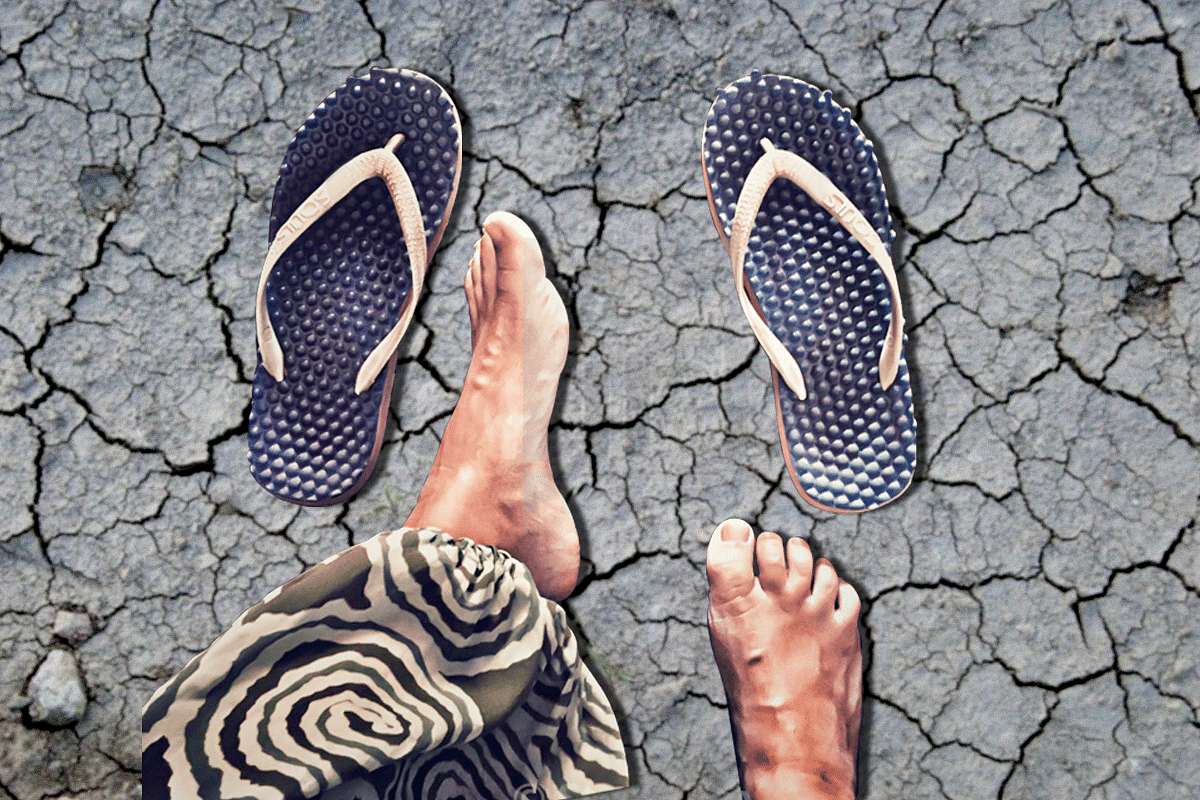Politics
Ensuring Essentials: Jharkhand Government To Distribute Sandals To State’s Tribals
- All this while, tribals have had little access to footwear, as a result of which many have suffered injuries while working in the forests.
- In Chhattisgarh, the current government has scrapped a similar scheme initiated by the previous BJP dispensation, drawing flak from citizens.

The Jharkhand government will now play the people’s ‘foot’ solider.
Hemlata Silwari, 52, has been walking barefoot all her life. A resident of the remote Arkeda village in the Saranda forests of Jharkhand’s West Singhbhum district, this widow picks tendu leaves and collects firewood and other minor forest produce to eke out a barely subsistence living.
She has to walk an average of six to eight kilometers everyday, and this daily trudge to support her family — a disabled son, a widowed daughter-in-law and three minor grandchildren — is made more wearisome and hazardous by her lack of footwear.
A few months ago, festering sores on her feet kept her confined to her bed for more than a week. During this period, her family had to go without meals and had to depend on charity from their equally poor neighbours.
Last year, Hemlata suffered cuts from some shards of glass; the wounds got infected and she could not walk for more than two weeks till they healed. She was lucky — a neighbour, Ramchandra Murmu, died of septicemia from a cut he suffered in his feet while walking through the forest.
But Hemlata and her fellow adivasis can now bid goodbye to their barefoot travails, thanks to the launch of a laudable scheme by the Raghubar Das-led BJP government in the state.
Under this ‘Charan Paduka Yojana’, footwear will be provided to members of the poorest and most marginalised tribal groups in the state for free. About 100,000 tribals will be benefited under the scheme in its first phase that was launched by Das on 16 August.
The free footwear will bring about a lot of transformation in the lives of the tribals belonging to the groups that have been identified as Particularly Vulnerable Tribal Groups (PVTGs) by the Union Ministry of Tribal Affairs.
Prominent tribal rights activist Shiben Das says that the adivasis have to trek barefoot daily through forests to collect forest produce or in search of food and work. “They suffer cuts, bruises, infections and foot sores. So footwear will make their lives, and their daily treks, much more comfortable and hazard-free,” said Das.
A report prepared by the Singhbhum Janjati Kalyan Parishad that Das heads says that travelling bare feet over long distances is one of the biggest woes of the adivasis. A cement-manufacturing company has come forward to sponsor 100,000 rubber sandals for the poorest tribals under this scheme, as part of its Corporate Social Responsibility (CSR) initiative.
A Kolkata-based footwear manufacturing company has imparted training to 150 adivasi women from poor families at Chakradharpur and Chaibasa in making rubber sandals. These rubber sandals will be bought by the cement major and handed over to the state government for free distribution to beneficiaries from the PVTGs.
As per the 2011 census, 300,000 people in Jharkhand belonging to eight groups — Asur, Birhor, Birija, Korwa, Mal Pahariya, Pahariya, Souria Pahariya and Sabar — are PVTGs. While the poorest 100,000 will be covered in the first phase of the scheme, the remaining would be benefited in the second phase that will be rolled out from October this year.
The 150 women who have been trained in making the rubber sandals will have to make 100,000 pairs of sandals by the end of September for distribution to the PVTGs in the first phase of the scheme.
A spokesperson for the Kolkata-based footwear firm, which has trained the 150 women, said that they (the women) have formed two cooperatives. The equipment to make the sandals has been donated to the two cooperatives by the footwear firm.
The two cooperatives have the capacity to collectively make at least 50,000 pairs of rubber sandals a month. It will take the two manufacturing facilities six months to make the 300,000 rubber sandals for distribution among all the 300,000 members of the PVTGs.
Since the rubber sandals will be distributed to the beneficiaries — whose numbers will grow anyway every year — once a year, the two manufacturing facilities, run as cooperatives, are assured of at least six months’ orders from the state government.
The rest of the year, they will sell their products in the open market at Rs 150 a pair, which is cheaper than most other brands.
The last Raman Singh-led BJP government had pioneered a similar scheme in Chhattisgarh in 2005 and ran it successfully for 13 years till 2018 when it was voted out of power.
Earlier this year, the Congress government stopped the scheme and said the beneficiaries would get direct cash transfers into their bank accounts to purchase footwear on their own. But many tribal activists have criticised the Congress government’s decision as the promised sums have not been deposited in the accounts of beneficiaries as yet.
Introducing ElectionsHQ + 50 Ground Reports Project
The 2024 elections might seem easy to guess, but there are some important questions that shouldn't be missed.
Do freebies still sway voters? Do people prioritise infrastructure when voting? How will Punjab vote?
The answers to these questions provide great insights into where we, as a country, are headed in the years to come.
Swarajya is starting a project with an aim to do 50 solid ground stories and a smart commentary service on WhatsApp, a one-of-a-kind. We'd love your support during this election season.
Click below to contribute.
Latest